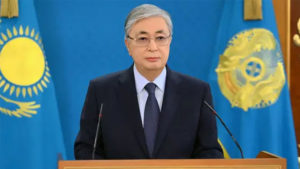 ALMATY (Reuters) – Security forces appeared to have reclaimed the streets of Kazakhstan’s main city on Friday after days of violence, and the Russian-backed president said he had ordered his troops to shoot to kill to put down a countrywide uprising.
ALMATY (Reuters) – Security forces appeared to have reclaimed the streets of Kazakhstan’s main city on Friday after days of violence, and the Russian-backed president said he had ordered his troops to shoot to kill to put down a countrywide uprising.
A day after Moscow sent paratroopers to help crush the insurrection, police were patrolling the debris-strewn streets of Almaty, although some gunfire could still be heard.
Dozens have died and public buildings across Kazakhstan have been ransacked and torched in the worst violence in its 30 years of independence.
President Kassym-Jomart Tokayev said foreign-trained terrorists were responsible for the unrest.
“The militants have not laid down their arms, they continue to commit crimes or are preparing for them,” he said in a televised address.
“Whoever does not surrender will be destroyed. I have given the order to law enforcement agencies and the army to shoot to kill, without warning.”
Moscow said more than 70 planes were ferrying Russian troops into Kazakhstan, and that these were now helping control Almaty’s main airport, recaptured on Thursday from protesters.
Demonstrations that began as a response to a fuel price hike have swelled into a broad movement against the government and ex-leader Nursultan Nazarbayev https://www.reuters.com/world/asia-pacific/powerful-ex-leader-nazarbayev-is-main-target-kazakhs-anger-2022-01-05, 81, the longest-serving ruler of any former Soviet state.
He turned over the presidency to Tokayev three years ago but his family is widely believed to have retained influence in Nur-Sultan, the purpose-built capital that bears his name.
SCARED
The protesters in Almaty appear mainly to come from the city’s poor outskirts or surrounding towns and villages. The violence has come as a shock to urban Kazakhs, used to comparing their country favourably to more repressive and volatile ex-Soviet Central Asian neighbours.
“At night when we hear explosions, I am scared,” a woman named Kuralai told Reuters. “It hurts to know that young people are dying. This has clearly been planned … probably our government has relaxed somewhat.”
In a state where scant political opposition is tolerated, no high-profile leaders of the protest movement have emerged to issue any formal demands.
One man who attended the first night of demonstrations and did not want to be identified said most of those who initially turned up were there to “express solidarity spontaneously”, before 100-200 “aggressive youths” started hurling rocks at police.
He said he had expected some opposition politicians to formulate demands, but in vain.
Mukhtar Ablyazov, an exiled former banker and cabinet minister turned opponent of the government, said the West must counter Russia’s move.
“If not, then Kazakhstan will turn into Belarus and (Russian President Vladimir) Putin will methodically impose his programme – the recreation of a structure like the Soviet Union,” Ablyazov told Reuters from Paris.
The interior ministry said 26 “armed criminals” had been “liquidated”, while 18 police and members of the national guard had been killed, figures that appeared not to have been updated since Thursday. State television reported more than 3,700 arrests.
On Friday, fresh gunfire could be heard near the main square in Almaty, where troops had fought protesters throughout Thursday. Armoured personnel carriers and troops occupied the square.
A few hundred metres away, a dead body lay in a wrecked civilian car. In another part of the city, an ammunition shop had been ransacked.
Unrest has been reported in other cities, but the internet has been shut off since Wednesday, making it difficult to determine the extent of the violence.
RUSSIAN INFLUENCE
Moscow’s swift deployment demonstrated Putin’s readiness to use force to maintain influence in the former Soviet Union, at a time when he has also alarmed the West by massing troops near Ukraine, whose Crimean peninsula Russia seized in 2014.
The mission falls under the umbrella of the Collective Security Treaty Organization, comprising Russia and five ex-Soviet allies. Moscow said its force would number about 2,500.
Russian Deputy Foreign Minister Alexander Grushko said Moscow was “doing as allies should”.
White House spokeswoman Jen Psaki said Washington was watching Russia’s troops for any “actions that may lay the predicate for the seizure of Kazakh institutions”.
Tokayev’s administration said the Russians had not been engaged in combat or the “elimination of militants”.
Kazakhstan’s other major neighbour, China, has backed Tokayev. State television said President Xi Jinping had told him Beijing opposed any use of force to destabilise Kazakhstan.
Nazarbayev, who was the last Soviet-era Communist Party boss still ruling an ex-Soviet state when he passed the presidency to Tokayev in 2019, has not been seen or heard since the protests began.
Tokayev removing Nazarbayev and his nephew from security posts on Wednesday.
The apparent return of calm to Almaty helped Kazakhstan’s bonds to recoup some of the ground they had lost on the turmoil.
Kazakhstan is a major oil producer and the world’s top miner of uranium, and the unrest has affected global commodity prices. [MKTS/GLOB]
Oil output at its top field, Tengiz, was reduced on Thursday, the field’s operator Chevron said, as some contractors disrupted train lines in support of the protests.
Kazakhstan also accounts for close to a fifth of global bitcoin “mining”, the power-intensive process of recording cryptocurrency transactions, and Kazakhstan’s internet shutdown has curtailed the computing power of bitcoin’s global network. [nL4N2TM22L]
